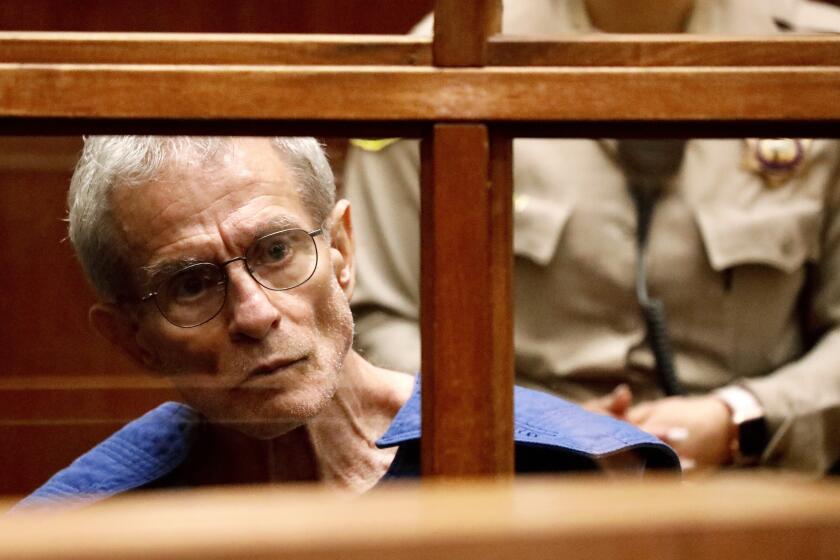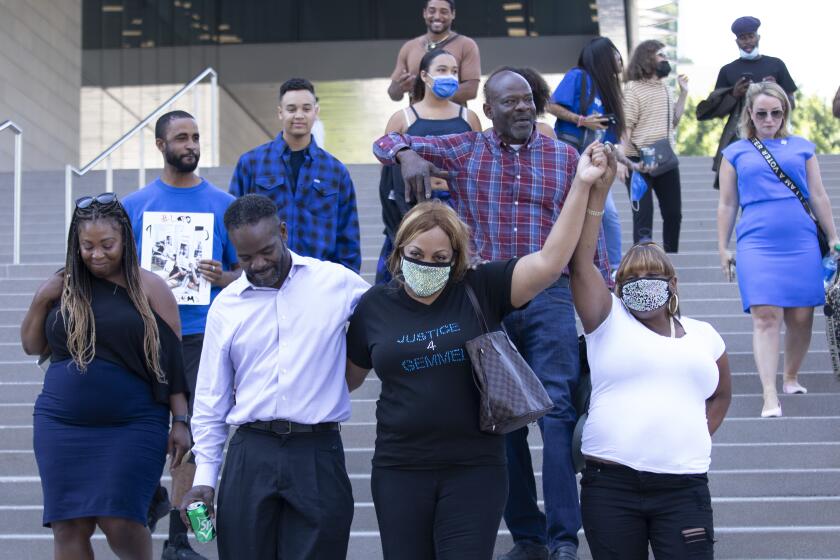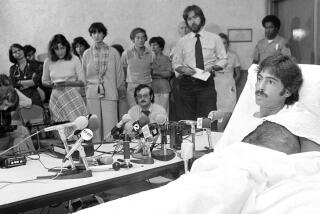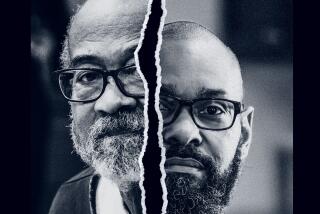Ed Buck sentenced to 30 years in prison for abuses that led to men’s drug deaths
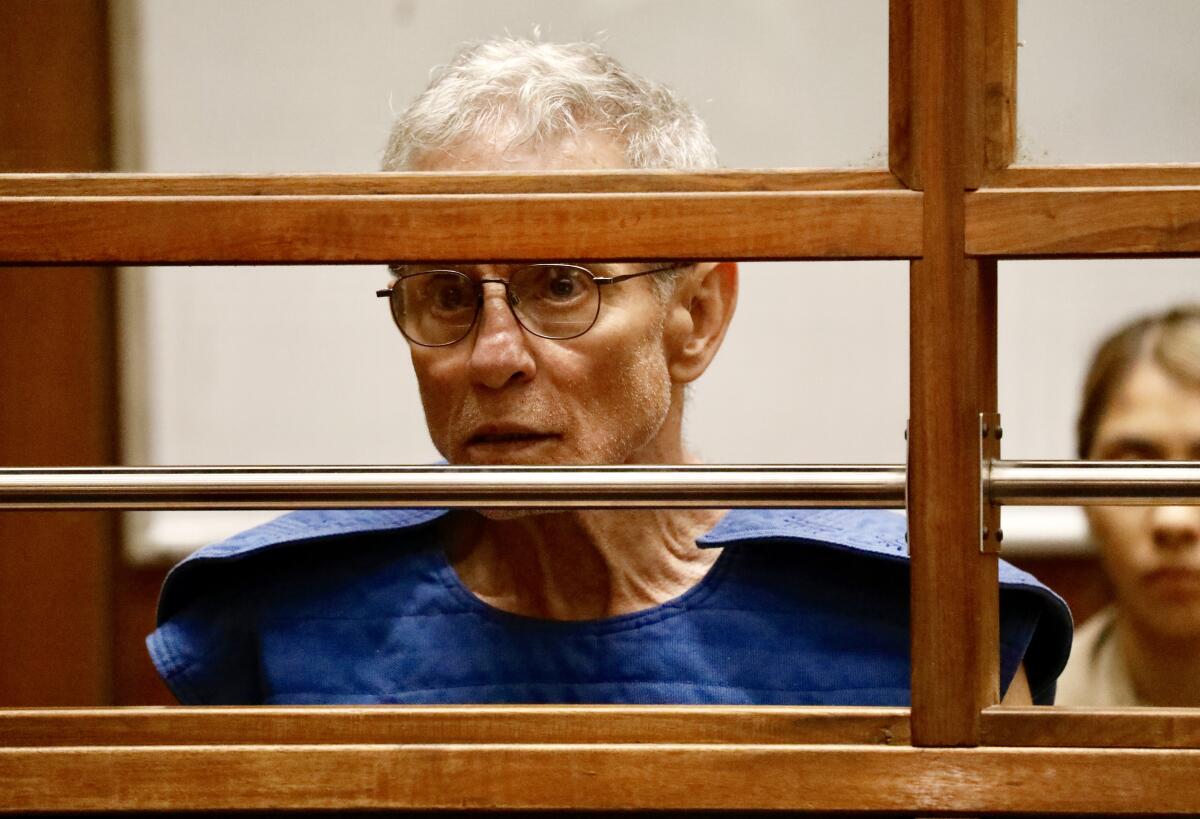
- Share via
Ed Buck, once a fixture of West Hollywood’s political scene, was sentenced Thursday to 30 years in prison for drug and sex crimes that included providing lethal doses of methamphetamine to two men.
To the outside world, Buck was a champion of causes such as fur bans and AIDS awareness, and a donor to Democratic officeholders.
But behind the walls of his Laurel Avenue apartment was a nightmare. For nearly a decade, the wealthy, white Buck lured young Black men at the lowest points in their lives — homeless, addicted, resorting to subsistence-level sex work — into what he called “party and play” sessions.
Amid squalor that belied his reputation as a man who had achieved great wealth at a young age, Buck plied the men with drugs and then sexually assaulted them while they were unconscious or immobile. In two cases, he injected his victims with fatal amounts of methamphetamine.
A jury convicted Buck last year of a host of felonies, including distributing methamphetamine resulting in death and enticement to cross state lines to engage in prostitution.
In the lead-up to Thursday’s sentencing at the federal courthouse in downtown Los Angeles, Buck’s lawyers had asked that the 67-year-old receive a sentence that would one day allow him to return to society, while prosecutors urged U.S. District Judge Christina A. Snyder to send Buck to prison for the rest of his life. Such a sentence was needed not only to punish Buck, they argued, but to protect the public.
“If Buck were ever released,” they wrote, “he would feed his compulsion to inject others until the day he died.”
On Thursday, Chelsea Norell, an assistant U.S. attorney, reiterated the need to put Buck behind bars for good, telling Snyder: “One death is a tragedy, but two is a pattern.”
Buck, speaking in a low, raspy voice, offered his “condolences” to the families of his victims but denied he had caused their deaths. Describing how he had spent much of his life advocating for political causes and gay and animal rights, he asked that Snyder “take a look at my life in total,” and not “the horrible caricature the government painted me as — a meth-fueled ax killer.”
Before sentencing Buck, Snyder said his case was “one of the most difficult and tragic” she had ever presided over.
“What has happened here is reprehensible,” she said.
::
Drug abuse was at the heart of Buck’s sexual behavior, according to testimony and evidence presented at his 2021 trial, which opened a window into a dark subculture of Los Angeles’ gay community.
Buck moved in a world steeped in drugs and defined by power imbalances between the solicitors of sex and the often destitute men who supply it. He advertised on Adam4Adam, a gay hookup site, that he was interested in “party and play” sessions, widely known to mean using methamphetamine during sex.
Ed Buck is found guilty exactly four years after Moore, 26, died of a methamphetamine overdose in Buck’s West Hollywood apartment.
A parade of men testified that Buck would offer them extra money if they “slammed,” or allowed him to inject them with the drug. In what prosecutors called a “carrot-and-stick approach,” he would sometimes withhold payment if they didn’t smoke enough methamphetamine or let him inject them.
In his squalid apartment, which was littered with drug paraphernalia and sex toys, Buck treated the men “like lab rats in his twisted experiments,” Norell wrote in a sentencing memo.
He drugged them to the limit of their bodies’ tolerance; once they were unconscious or immobile, he sexually assaulted them, choked them, slapped them. One man, injected with something that left him unable to move, managed to regain control of his body only when Buck revved a chain saw in front of him, sending adrenaline coursing.
Buck filmed many of the episodes. In a video played at trial, he gave stage directions to a masked man who was smoking methamphetamine: “Stare directly into the camera, flare your nostrils and blow it out slowly. Now, if you add wide-open eyes to that, it would be a perfect shot.”
More Times coverage of Ed Buck case:
One witness, Carlos, described learning from a friend that a man would pay him $200 to smoke methamphetamine and “prance around in underwear.” Living under an overpass at the time, shuffling between encampments in Hawthorne, West Athens and Gardena, “I had to fight to survive,” he testified. “I had to fight to do what I could to eat, to take care of myself, to still be a father.”
To protect their privacy, The Times withheld the last names of witnesses who described being sexually abused.
Carlos went to Buck’s apartment about 20 times over a six-month period. He’d use methamphetamine and GHB, a party drug; sometimes, Buck would spray an ethyl chloride cleaning solvent on a rag, hold it over Carlos’ mouth and watch him inhale.
Buck “liked to see me where I was barely able to stand, barely conscious,” he recalled. “He wanted me to be falling around all over the place,” a state in which Buck “would be able to do whatever he liked as far as touching and everything of that sort.”
Buck at times referred to Black men using the N-word, witnesses testified at trial.
Judge says traumatized jurors might need counseling after seeing graphic meth-and-sex sessions of well-connected player in West Hollywood politics
Two men died in Buck’s apartment, their bodies found in near-identical circumstances. Gemmel Moore, 26, flew in from Texas on July 27, 2017, on a ticket that Buck had purchased. Hours later, he was dead. A coroner’s investigator found Moore lying on a mattress with pornography playing on the television. Syringes, pipes, sex toys and methamphetamine were found throughout the apartment.
“This is so dark,” Cory McLean, Moore’s friend, said as he addressed Buck at Thursday’s hearing. “No one could even fathom that this was real, this was true. And you created it.”

Authorities initially ruled Moore’s death an accident. Not until his mother and friends publicly questioned the finding did Los Angeles County sheriff’s detectives reopen an investigation into whether the fatal dose was self-administered.
Buck wrote in a text message, misspelling the name of his victim, “I have eight more days to go with this Jamall more sheriff investigating me bulls—. On the 28th of this month we will know what’s going to happen and the muzzle comes off and I can speak.”
He sent the message to Timothy Dean.
Dean, 55, a former basketball player who worked as a fashion consultant at Saks Fifth Avenue, went to Buck’s apartment on Jan. 7, 2019. Within an hour, he had overdosed, Norell wrote. Before calling 911, Buck wiped up Dean’s vomit and blood and threw syringes and pipes out of a window, according to Norell.
Authorities found Dean, like Moore two years earlier, lying on a mattress in Buck’s living room. Three large mirrors were propped up against the walls. The bottom of Dean’s feet were white, indicating he’d been dead for some time, Norell wrote.
It took the near-death of another man for authorities to finally arrest Buck. In September 2019, Buck injected Dane Brown with three doses of methamphetamine. Brown managed to stagger out of Buck’s apartment to a nearby gas station, where he called 911.
Buck was arrested a week later.
“Buck does not value human life beyond his own,” Norell wrote, urging Snyder, the judge, to send him to prison for the rest of his life. “He used human beings as playthings, destroying their lives merely to appease his own sexual gratifications.
“He has killed two people and nearly a third,” she continued, “torn apart families, created and amplified debilitating addictions among the most vulnerable populations, and has done it all without an ounce of remorse.”
::
But Mark Werksman, Buck’s lawyer, asked Snyder to see his client’s “increasingly risky and self-destructive behavior” through the lens of the abuse he had suffered as a child and his spiraling drug addiction.
Born in Steubenville, Ohio, Buck moved with his family when the steel mills closed and the small city on the banks of the Ohio River fell into a recession, Werksman wrote in a sentencing memo. The family settled in Phoenix. His father took a job at a sewage treatment plant, while his mother worked on a production line and, later, as an office administrator.
Starting when Buck was 11, his father would sexually abuse him when his mother was out of the house, Werksman wrote. “His father made him think it was his fault for seducing [him] into perverted sexual acts,” Werksman told the court Thursday. Buck, who was raised Catholic and served as an altar boy, also was molested by several priests and a monsignor, according to his lawyer.
Norell said Buck’s account of being sexually abused as a child was uncorroborated, but “even if we gave him the benefit of the doubt,” she told the court, “abuse 50 years ago does not begin to excuse his abuse here. If anything, it should have made him more empathetic.”
As a young man, Buck worked as a model and small-time actor in Europe, then returned to Phoenix, where he took a job as a bicycle courier for a friend’s business providing information to car insurance companies, his 94-year-old mother, Margaret Buchmelter, wrote in a letter to the court. He eventually bought the struggling company, Rapid Info Franchise, turned it around, and sold it in 1986 for $1 million, Buchmelter wrote.
A millionaire at 32, Buck retired from business and threw himself into political causes in Arizona, such as leading a campaign to impeach the state’s governor, Evan Mecham. Buck hung a piñata effigy of the governor in an office devoted to the campaign. Mecham then declared him a “militant homosexual.” Buck replied: “He’s right. So what?”
The victims of Ed Buck, who was convicted in the overdose deaths of two Black men, say it felt like no one believed them.
Buck moved to California in 1991, settling into the rent-controlled, three-bedroom, two-bathroom apartment on Laurel Avenue where, decades later, two men would die.
By his 40s, Buck was abusing amphetamines, which he’d been prescribed to treat narcolepsy and other conditions, Werksman said. From there he became “a functioning drug addict,” smoking and injecting methamphetamine on a daily basis until he was arrested, his lawyer said.
“There are two Ed Bucks,” Werksman said in court. One a “comic book supervillain,” a “sociopathic, syringe-wielding sexual deviant” described by law enforcement authorities, the other a “redeemable” man who raised money for AIDS research and pushed for the public to recognize a disease that was ravaging the gay community.
Before he was sentenced, Buck told Snyder he had “tried to live a good life, a life dedicated to making the world a better place.” He apologized for what he called “my part” in the deaths of Moore and Dean, describing them as “men I cared for, men I loved,” but he denied killing them.
“I wish I could turn back time and change things,” he said, “and if I could, I would.”

After the hearing, relatives of Buck’s victims said the 30-year term was appropriate, even if they would have preferred that the judge made sure he would never leave prison. “No amount of time will bring my brother back,” said Joann Campbell, Dean’s sister, “but it brings some solace that he will be in prison for a very long time.”
As for his apology in court, “I didn’t buy any of it,” Campbell said, calling it “too little, too late.”
If Buck does not cause problems in prison, he could be released after serving 85% of his term, at which point he would be in his early 90s, Snyder said. Werksman, however, said the judgement was effectively a life sentence. “We’re not sentencing Methusalah here,” he said, referring to the Biblical figure who lived for 969 years.
Questions about Buck’s wealth are still hanging over the case. Prosecutors asked Snyder to order Buck to pay $51,562 in restitution to his victims and a $400,000 fine, citing a probation officer’s estimate that Buck was worth about $2 million. When Buck was arrested, investigators found bank statements showing he held $3,477,335 in several accounts, Norell wrote.
Buck’s lawyers called these figures “grossly inflated.” His mother lent him $1 million to pay his legal fees, Werksman wrote; he owes several hundred thousand dollars to the Internal Revenue Service, and he must pay a similar amount in capital gains taxes after one of his previous attorneys liquidated much of his assets.
Prosecutors and Buck’s attorneys agreed to postpone a hearing to determine the amount that Buck must pay in restitution while his lawyers gather records of his finances.
Times staff writers Michael Finnegan, Hailey Branson-Potts, Richard Winton and Matt Hamilton contributed to this report.
More to Read
Sign up for Essential California
The most important California stories and recommendations in your inbox every morning.
You may occasionally receive promotional content from the Los Angeles Times.

